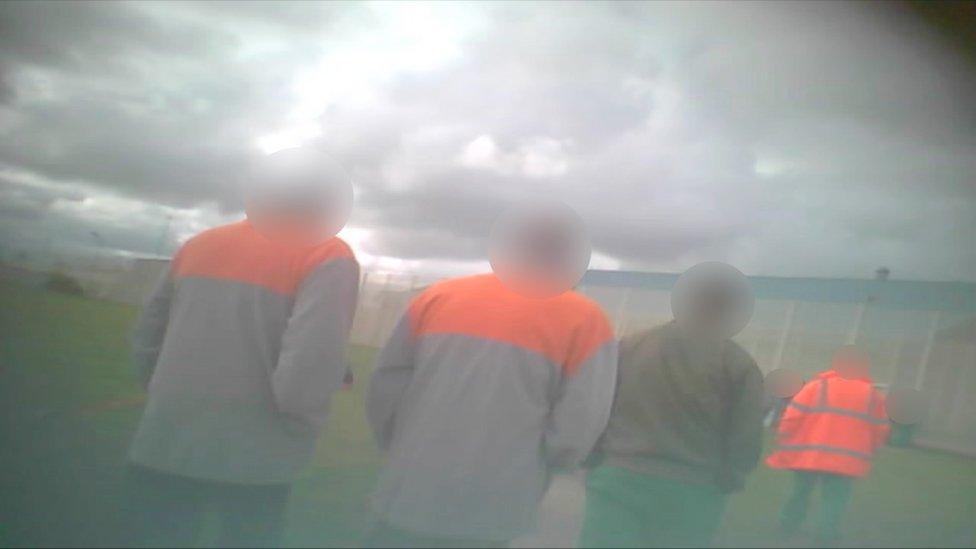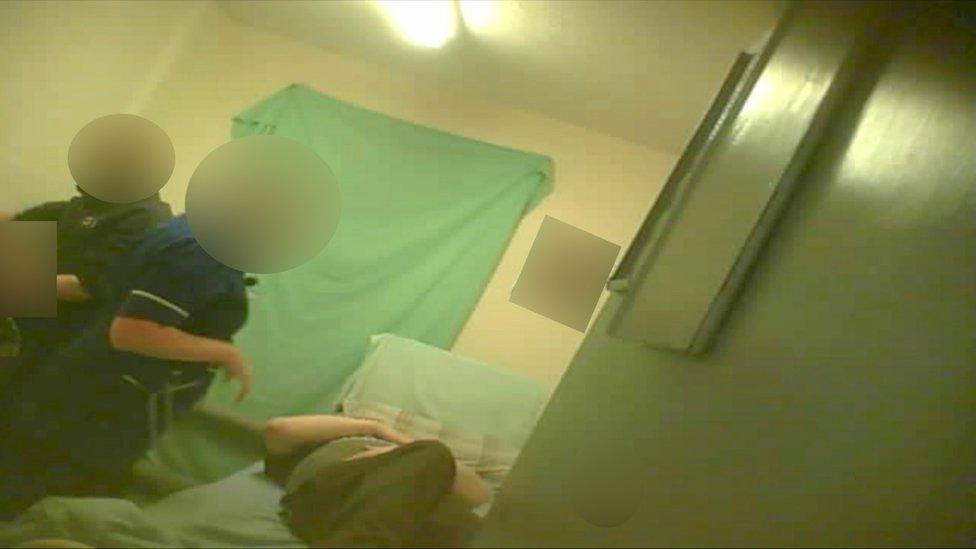Reporting undercover from the prison front line
- Published
Undercover footage shows prisoners incapacitated by drugs
An undercover investigation by Panorama has revealed the reality of life behind bars in the crisis-hit prison system. From prisoner officers who say they've lost control to some inmates regularly taking drugs, undercover reporter Joe Fenton explains what it's like to work on the prison front line.
Prison custody officer Joe Fenton, Her Majesty's Prison Northumberland - this was my life for two months as an undercover reporter for the BBC's Panorama programme.
HMP Northumberland is a prison with a problem. Many problems in fact. And within hours of being in the job, I was to see astonishing examples of this.
On my very first day, I was taken into a room with some of the other new recruits where we were shown a table covered in drugs. It was a massive find by prison staff - 2.5kg of a drug called spice - a much stronger, cheaper, synthetic alternative to cannabis.
Spice is now one of the most popular illegal drugs used in prison. Prisoners told officers this find had barely scratched the surface.

In my first week, I was responsible for escorting 70 prisoners but in reality, it felt like they were escorting me. I didn't really know where I was going and I just followed the prisoners, opening the gates for them.
It didn't take too long to realise that the inmates were, in effect, running this prison. I saw prisoners stumbling around drunk, others who were high on drugs and some struggling to cope with addiction.
On a standard 10-hour shift, the demands from prisoners were endless.
The work didn't stop from the moment we got there to the moment we left. You just can't work five or six days solid there - it ruins you and you don't feel like a person any more, you just exist.
The prison officers were all drained and with the constant demands from prisoners, I felt like I was working in a very busy hotel with a lot of angry guests.
I've seen staff at their wits' ends and staff who are struggling to cope.

Nurses attend to a prisoner who has taken the drug spice
There were drugs everywhere in HMP Northumberland and I found myself walking through clouds of smoke, some of which were from prisoners smoking spice.
Spice affected prisoners in different ways. Some would look a bit blurry-eyed. One reacted by moving his forearms around uncontrollably, his eyes completely vacant and his face expressionless.
Officers called the nurses for this particular prisoner but they weren't called for every inmate who reacted badly to spice. It happens too often.
The time officers had least control was during the couple of hours in the evening when prisoners were allowed to socialise - they could go into each other's rooms, close the door and even lock it from the inside, although we could then unlock it again.
Often I would be alone on a landing and it wouldn't have been safe for me to challenge them by myself. I often felt that there was nothing I could really do if I suspected prisoners were about to deal or take drugs.
Some officers told me they often don't confront prisoners because they are not confident backup will arrive if they are attacked.
Prison officers have the power to challenge prisoners but the prisoners had lookouts and warning codes so they were often one step ahead. This enabled them to hide their drugs, put out their cigarettes or throw their mobile phone under the pillow.
Those few extra seconds were all they needed.
As in all walks of life you'll get people who can cope by themselves and those who need a little bit of help. It's the same in prison.
I met one vulnerable prisoner who was being bullied - we're calling him John in order to disguise his identity.
On one occasion, I witnessed him totally off his head while other prisoners watched, laughing - I suspect they had spiked his cigarettes with spice. He told me he'd previously had buckets of water thrown over him and had been burnt with cigarettes.
It would be great if staff were there to look after these prisoners every step of the way but I felt there just weren't enough officers to protect people like John all the time.
BBC Panorama spent two months inside one of the country's biggest prisons
Prison officers repeatedly told me they had lost control of the prison. I saw officers worried about their safety and losing confidence.
I witnessed one officer convulsing on the floor because he had inadvertently inhaled spice while patrolling a landing.
It was hard to see this happening to a colleague, someone whose company I enjoyed. But this is what prison officers have to deal with and it wasn't an isolated incident.
Sources have told us that at least three members of staff at this prison needed hospital treatment for inhaling spice smoke in the last seven months.
And the drugs continue to flow in - prison officers told me that that's because of lapses in security.
While working on one house block at HMP Northumberland, staff found black clothing, balaclavas and wire-cutting tools.
I witnessed doors where the alarms weren't working and a hole in an internal security fence which would have allowed prisoners to collect drugs thrown in from the outside.
I have a lot of sympathy for the prison officers I met while working at HMP Northumberland - there are many good people there trying to do a difficult job with limited resources.
Prisoners are in prison for a reason and prisons must exist to both punish and rehabilitate. But from my experience, I didn't see much of either.
Watch Panorama Behind Bars: Prison Undercover on Monday 13 February at 20:30 GMT on BBC One. Or catch up on iPlayer.